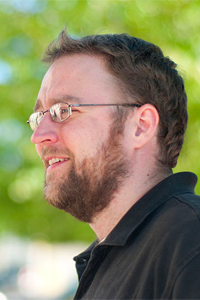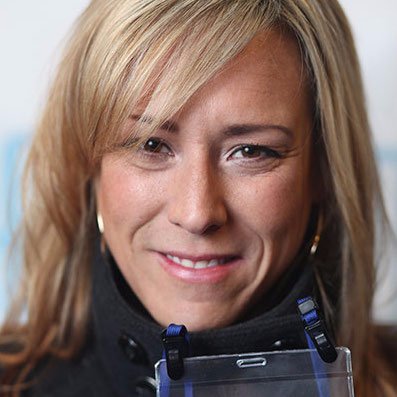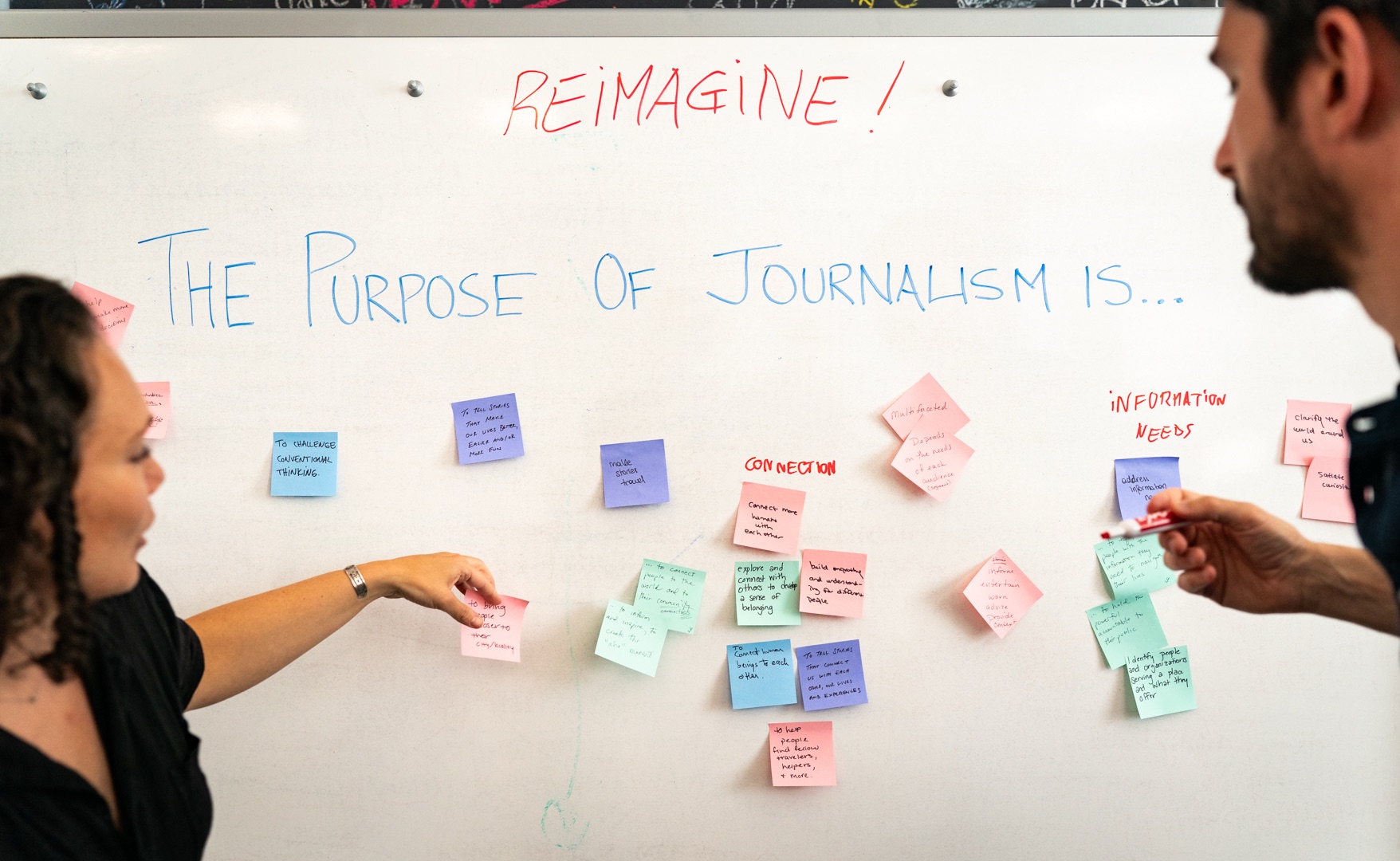The Lab’s profiles are Q&As with smart people who are shaping the future of media. Follow the series.
In many ways, Clay Johnson is a force of nature. He is best known as the co-founder of Blue State Digital, his book — “The Information Diet: A Case for Conscious Consumption” — and as a full-throated advocate for open source information in the federal government. In fact, meeting and befriending Clay was the highlight of my trip to Webstock in February. Formerly, he was the director of Sunlight Labs at the Sunlight Foundation. In August 2012, Clay was selected as a Presidential Innovation Fellow and his federal procurement platform RFP-EZ is thought of as one of the big wins to come out of the program so far. He is now working to further that platform with Procure.io and Screendoor. His has won a number of awards, including the Google/O’Reilly Open Source Organizer of the year in 2009 for his work at Sunlight Labs, and he was awarded the CampaignTech Innovator in 2011. He was was one of Federal Computing Week’s Fed 100 in 2010. Read on to learn more about his unique perspective on media and culture.

What is the question that no one asks you, but you wish that someone would?
"Can I see pictures of your son?"
Why is technology important to the media industry?
Primarily, because people are lazy. Everybody likes to complain that "reporters are lazy" but that's just not fair. People are lazy too — remember, journalists are providing people with news because they're effectively too lazy to do it themselves.
Think about this for a second: Jack Abramoff should have been caught by a computer. The data should have been there (in mandated transparency reports from lobbyists), it should have been measured, and he should have been caught, either by an algorithm that the private sector makes in order to inspire great investigative reporting, or by the public sector in order to enforce the law better. It's actually quite farcical that we live in a world where that doesn't happen.
That capability is right there, and it's obvious. That's why technology is important to the media industry, and important to the society that media is supposed to be serving.
Who is the most creative technologist out there right now? What companies or media outlets that we might not know about are doing exciting, innovative media, tech work?
Jeremy Ashkenas. He's the Chuck Norris of Javascript. His keen eye both for design not only for the user, but also improving the user experience for developers is profound. Coupled with his experience in the newsroom at The New York Times, he's the person out there I expect the most from in the next decade.
Also GitHub. I think the rest of 2013 is going to be a big year for GitHub — their latest move to easily allow people to render maps in git repositories blew my mind because it begins the transition to a more interesting audience. There are two obvious steps for GitHub here: the first is creating viewers for other kinds of files — like perhaps the csv. The second one — and the one that GitHub is very well suited for — is showing the diffs.If I were running a newsroom, I’d be making my team experiment with workflows in GitHub ... In a year, knowing how to use GitHub is going to be very important for a newsroom.
Check out that last link, and imagine what's going to happen when you can use that swipe functionality with plot points on a map. Or when you start isolating the differences between two versions of a CSV. The interesting stories in data aren't in the rows, they're in the differences between them. And I think GitHub is getting ready to make as much of a play in data as it has in code.
As an aside — if I were running a newsroom, I'd be making my team experiment with doing workflows in GitHub. I'd be doing forking and pull requests via GitHub, collaborative editing via GitHub, exchanging story ideas and research tasks via GitHub issues, and making sure my reporters knew how to use GitHub. In a year, that'll pay off because knowing how to use GitHub is about to be very important for a newsroom.
How can people use technology to create change in the world?
There's not a response to this question I could give that wouldn't be vapid. Here's my advice to any changemaker: seek achievable outcomes, and think backwards from them. If you want to end money's relationship with politics, think that through. What does the world have to look like in order for you to do that? What laws need to pass? Who needs to be involved to make those laws pass? How do you get to them, and how do you make them think the way that you do.You should probably use some technology. But if having some drinks with a member of Congress' nephew gets you the same result, I'd invest in the drinks.
If technology is involved in making that happen, then great. You should probably use some technology. But if having some drinks with a member of Congress' nephew gets you the same result, I'd invest in the drinks.
If you could design an app that would solve any problem in the world, what would it be?
I'm making those applications now. But besides Procure.io and Screendoor, I would like to change Facebook and Google+ to give me a feature to automatically connect me with the people I live in closest proximity to — my neighborhood or apartment building. It's too easy to sit behind a computer and not know your neighbors.
What is the biggest tech challenge that media companies will face over the next 5 years?
The weatherization of the rest of the news. Adrian Holovaty opened that box with EveryBlock, and though it didn't succeed, it's coming. The digital five-day forecast made it so the weatherman isn't that useful anymore, and there's no reason why crime, health, sports, or every other piece of reporting (and a lot of reporting we're not getting) can't be pulled out of data and distilled into something interesting.
When I talk about my book, the one question I ask consistently is "Who here knows the child poverty rate of the area they live in?" And nobody knows. Nor does anybody know the direction it's moving! But I think fairly soon, we're going to see healthy community key indicators coming up and getting reported on, and it's going to change the way the newsroom works a bit.
Once this is done and we figure it all out, it's going to change how reporting is done because a lot of it will be done based off of those indicators. I think that's (finally) a way to make money off of doing good reporting, and providing service to the public. Newsrooms will resist this but I think it's time to dispose of the strangely religious overtones of investigative reporting. Culturally I think a lot of reporters are afraid of technology and afraid of what it means to their jobs, and think its up to them to own the relationship between people and the facts.Good design is ridding someone of suffering that they didn't know they had. Good design feels like when your back cracks and all the sudden you can sit up taller.
I'd be scared too — technology gives people the ability to relate directly to news and stories without them, much like growing literacy helped a lot of people to achieve a relationship with God without the priesthood. You can't fight this — technology has changed our definition of literacy, and now people want more direct relationships.
If you could change one thing about media today, what would you change?
I would require television broadcasters to eliminate all advertising during their legally mandated news broadcasts. It was a mistake to do that when we gave them the licenses, and it's a mistake to let it continue. Let them provide news as a community service for one hour a day, and let them profit from the other 23.
What is the biggest luxury in your life?
Time. Time is my only non-renewable resource. I can always get more money, I can always get more stuff, but I can never get more time. So my luxury, the thing I work the hardest for, and the thing I appreciate the most when I have it, is time.
Who inspires you most?
Chris Stevens. Seriously, if you're going to click one link in this interview, this is the one. Despite the sepia tone, this will be the best part of your day.
What is good design? What excites you about technology design?
Good design is ridding someone of suffering that they didn't know they had. Good design feels like when your back cracks and all the sudden you can sit up taller. Great design buys me time. I get excited when a good designer finds a way to buy me time.
Who is the greatest designer who ever lived?
Tie: Enki and James Madison (the last paragraph here is particularly important)
What do you read religiously?
Hacker News, GitHub's explore section, and the Federal Acquisition Regulation, and An Awesome Book
What applications do you have open while you're working?
iA Writer, Safari, Chrome, Dropbox, Divvy, Flycut, Alfred, SublimeText 2, Messages, Keynote, CloudApp, RescueTime, and Reminders. Sometimes Spotify.
What could the world use a little more of?
Why Healthy Information Diets, of course.
What could the world use a little less of?
The Paperwork Reduction Act.
Using the theory ‘Hire humans. Not skills. Not roles.’ as inspiration, the Lab’s profiles are Q&As with smart people who are shaping the future of media. Catch up and/or follow the series. Find and follow Clay Johnson on Twitter, @cjoh.
About the author





